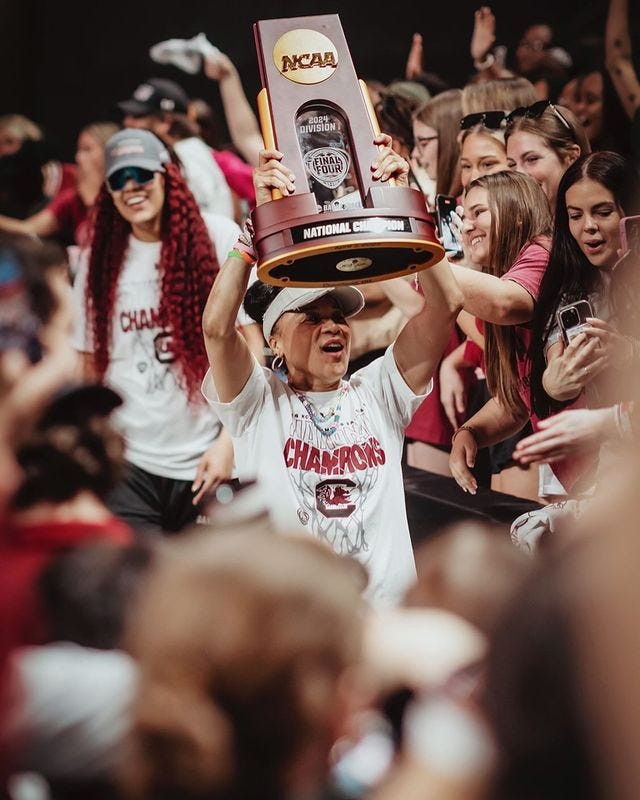Sunday afternoon in Cleveland, Ohio, Dawn Staley’s South Carolina Gamecocks capped off an undefeated season with a 87-75 win over the Iowa Hawkeyes in the NCAA Division I women’s basketball national championship game. It’s Staley’s third national championship as a coach — second in three years — and, given she lost five of last season’s starters to the WNBA draft in 2023, might be the most impressive coaching job of her storied career.
And yet, as impressive as her on-court work was this weekend, in my opinion, she made by far her biggest impact off of it.
On Saturday morning, during Staley’s press conference, Dan Zaksheske of OutKick — a right-wing sports blog that’s minimal coverage of women’s sports is primarily dedicated to ginning up controversy and outrage — asked Staley if she could tell him what her “position” was on the “debate/discussion/topic about transgender athletes, biological males, in women’s sports.”
After his question, Staley paused and took a sip of her water, clearly choosing her next words carefully.
“I’m on the opinion of, if you’re a woman, you should play. If you consider yourself a woman and you want to play sports or vice versa, you should be able to play. That’s my opinion,” she said. “You want me to go deeper?”
Zaksheske rephrased the question: “Do you think transgender women should be able to participate?”
“Yes, yes,” Staley said. “So now the barnstormer people are going to flood my timeline and be a distraction to me on one of the biggest days of our game. And I’m okay with that. I really am.”
And with that, Zaksheske scurried out of the room, the press conference moved immediately back to basketball questions, and we all returned to our previously scheduled programming.
But, as someone who has covered the plight of trans women in sports for a decade, and has closely followed the right-wing movement over the past four years to get trans women banned from sports — and, subsequently, society-at-large — I had trouble returning to business as usual.
There is so much fear-mongering, politicization, misinformation, and ignorance about trans women in athletics. And it does real harm. According to Katie Barnes of ESPN, since 2020, 24 states — including South Carolina and Iowa, who were represented on the court Sunday — have enacted legislation that restricts the participation of trans girls and women in girls and women’s sports.
In this hostile climate, it’s worth taking a beat to examine the power that Staley’s words carry.
In today’s newsletter, we’re going to hear directly from trans athletes and women’s basketball fans who were moved by Staley’s support, and look at the potential political and policy impact it could have.
“To have one of the best basketball coaches, of one of the greatest teams, on the eve of one of the biggest sporting events, speak out in support of the .0007% of college athletes who have been the most socially and politically targeted, is what leadership is all about,” said Hudson Taylor, the founder and executive director of Athlete Ally.
“Staley’s comments show that those who most fight for and believe in the growth of women’s sports, are also those who fight for and believe in a future for sports filled with inclusion, love and acceptance for transgender athletes.”
I want to be clear about one thing: This was not the time or the place to ask such a question. It was not asked in good faith. I would have not faulted Staley at all had she politely declined to answer it, as Iowa head coach Lisa Bluder did just a couple of hours later.
But the way Staley chose to use that moment, not only to affirm trans women and their place in women’s sports, but acknowledge that she was willing to accept the hate and backlash that would come along with her statement?
It mattered. A lot. Or at least I, as a journalist and ally, thought it did. I wanted to hear directly from the trans community, as their voices all-too-often get buried in this conversation.
On Twitter, I asked trans people to email me if they were willing to share what Staley’s statement meant to them. I got over a dozen responses, and, with permission, am sharing a few with Power Plays readers.

Meredith is a nonbinary University of South Carolina student, who has been a diehard women’s basketball fan since the Gamecocks won the 2017 national championship.
“It’s really hard to be openly queer in SC,” she said, adding that she grew up in a Christian household and is only beginning to feel comfortable in her gender identity.
“I heard about what Dawn said earlier today and it filled me with joy. It was a relief to hear this from her for several reasons, one being that she made comments last week about how God brought her to this moment,” Meredith said. “Knowing that she accepts anyone for their identity while simultaneously holding her beliefs makes me even more of a fan. Dawn is proof that someone can love God while also loving others for who they are.”
Hannah Bosso, a trans nonbinary softball and indoor soccer player, said Staley’s words “made me feel safe as a trans athlete.”
Ritz, a 24-year-old trans woman who played tennis in high school, said that Staley’s words felt like a “million breaths of fresh air.”
“I think the biggest thing is the fact that she knew there would be freaks coming out of the woodworks to bash her, and she just doesn’t care about it at all,” Ritz added. “That’s what meant the most to me.”
For one trans woman, who wanted to remain anonymous, Staley’s words felt like an invitation back to a world she’d felt shut out of since coming out.
“I have been scared to get back into sports since transitioning and her statement might just be what pushes me back.”
“I deadass cried for like half an hour hearing her answer for the first time and just kept the video on repeat the whole time,” she said. “I have been scared to get back into sports since transitioning and her statement might just be what pushes me back.”
Ina Fried, a journalist and founder of the #letters4transkids project, recognized the bigger-picture implications.
“As a 20+ year huge fan and supporter of women’s sports and especially women’s basketball, it is so powerful to hear her message of inclusion,” Fried said. “There are so many challenges facing women’s sports compared to men’s — lesser facilities, smaller media deals, lower budgets, etc. and yet all we ever hear about from the ‘save women’s sports’ crowd is about banning trans athletes.
“We can impact women’s sports so much more by giving them the attention and respect the deserve than by worrying that someday maybe a trans woman might win something.”
There have been policies in place to allow trans women to compete in women’s sports on the Olympic level since 2003 and on the NCAA level since 2010. Said policies involved the athletes undergoing hormone suppression treatment over a designated period of time to bring their testosterone levels below a certain threshold.
And yet, since 2003, trans women have not taken over women’s sports, and, in fact, there have only been a small number of trans women to succeed on the top levels of women’s sport. But right-wing instigators — who, unfortunately have been joined by a very small but vocal group of high-profile leaders in women’s sports — continue to use the existence of those athletes as evidence that women’s sports is under attack by trans women, a fictional tale that is not backed by data or reality.
But the alarmism is working. In addition to the onslaught of anti-trans legislations at the state level, many athletic organizations are enacting anti-trans policies.

The weaponization of Title IX against trans youth in sports has reached an inflection point
Just today (Monday), the National Association of Intercollegiate Athletics (NAIA), the governing body for athletics at small colleges, issued an outright ban on trans women competing in women’s sports at their institution.
Last month, the NCAA, which already abruptly altered its trans inclusion policy in 2022 to make room for more restrictions, was sued by more than a dozen current and former women’s college athletes in a federal lawsuit that accuses the organization of violating their rights by allowing transgender women to compete in women’s sports.

Could the NCAA follow in the NAIA’s footsteps? That is certainly a fear of some in the LGBTQ advocacy space, though I was unable to substantiate that fear with my reporting.
But on championship Sunday, NCAA president Charlie Baker stopped by the media center for an impromptu media scrum with reporters. I asked him about Staley’s statement and whether we can expect any changes to the NCAA trans inclusion policy in the future. His answer was noncommittal at best.
“Our policy is currently what I would describe as one that’s reasonably consistent with where most of the governing boards across the country, and even in most of the international fields, is located. It’s a policy that gets renewed every once in a while based on data and information,” Baker said. “It’s been adjusted several times, and we’ll just continue to act on that based on data that’s available and also how we fit into the grander scheme of what’s going on in sports generally.”
One thing is clear right now: Policy makers are listening to feedback about trans participation in sports. Nothing is set in stone. Change is possible, both in positive and negative directions.
The hope is that Staley’s words — and the fact that other influential names in the sport, such as Minnesota Lynx head coach Cheryl Reeve and retired WNBA superstar Sue Bird, backed her up — will carry enough weight to make as much difference on the political level as they did on the personal one.
“So many of these anti-trans inclusion policies are made in a vacuum. They are widely promoted and enacted by men with little to no knowledge about women’s athletics. They ignore the most up-to-date research. And they ignore the realities of women’s athletics and the real challenges women and girls are facing,” Ashland Johnson, the founder of The Inclusion Playbook, said in a statement provided to Power Plays.
“Now, with one of the most celebrated and respected women in athletics, who actually has skin in the game, speaking out to support trans women participating in athletics, the question remains: Will policymakers put politics aside and listen to the very women they claim they are trying to protect?”





















